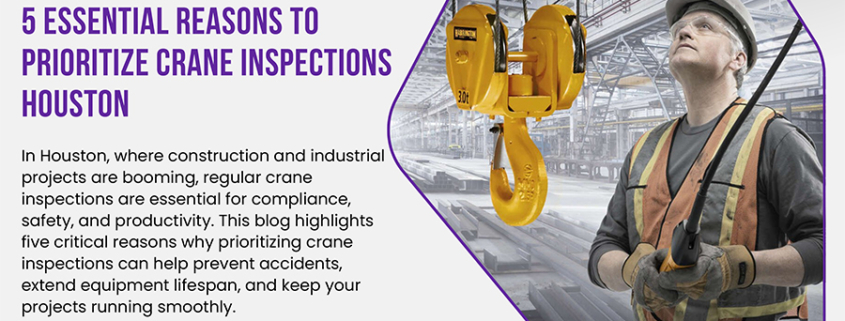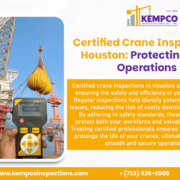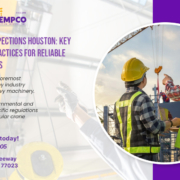5 Essential Reasons to Prioritize Crane Inspections Houston
Cranes are essential for many industries in Houston, from construction and manufacturing to oil and gas. These powerful machines handle heavy loads, making operations more efficient. However, with great power comes great responsibility. Cranes require regular inspections to ensure they remain in top working condition. Neglecting this can lead to costly damages, operational delays, and even dangerous accidents.
Prioritizing crane inspections is not just about meeting industry regulations—it’s about maintaining a safe and efficient work environment. Here are the crucial reasons why Crane Inspections Houston should always be a priority in Houston.
1. Ensuring Workplace Safety
Cranes operate in high-risk environments, lifting and moving tons of material daily. A minor issue in a crane’s components, such as a frayed wire rope or malfunctioning brake system, can result in a catastrophic failure. Regular inspections help identify these issues before they escalate.
Workplace safety should always come first. A well-inspected crane reduces the chances of falling loads, structural collapses, or unintended movements. When inspections are carried out consistently, operators and other workers can perform their jobs with confidence, knowing the equipment is reliable.
2. Compliance with Regulations
The Occupational Safety and Health Administration (OSHA) and other regulatory bodies have strict guidelines for crane operations. These regulations exist to protect workers and prevent accidents. Businesses in Houston must adhere to these safety standards to avoid penalties, legal issues, and project shutdowns.
Routine inspections help companies remain compliant with industry standards. When safety records are up to date, businesses can operate without worrying about sudden compliance audits or unexpected fines. Staying ahead of inspections is always better than dealing with the consequences of non-compliance.
3. Preventing Costly Downtime and Repairs
Cranes are major investments, and keeping them in good condition is essential for business continuity. Unexpected breakdowns can bring an entire project to a halt, leading to financial losses and project delays. A faulty crane not only stops operations but also requires emergency repairs that are often more expensive than preventive maintenance.
Regular inspections catch wear and tear early, allowing for minor repairs before they turn into major problems. Addressing small issues promptly extends the life of the equipment, reduces repair costs, and ensures projects stay on schedule. A well-maintained crane is far less likely to cause delays due to mechanical failure.
4. Protecting Workers and Equipment
Cranes are designed to carry extremely heavy loads, and any failure can put both workers and valuable materials at risk. A dropped load can damage expensive equipment, destroy materials, and even cause severe injuries or fatalities. These incidents not only affect morale but also result in lawsuits, medical costs, and insurance claims.
By scheduling routine inspections, companies reduce the risk of workplace accidents. Inspectors assess key components such as wire ropes, hooks, control systems, and structural integrity. When these elements function properly, workers can operate cranes without unnecessary risks, and businesses avoid the financial strain of equipment loss and injury claims.
5. Boosting Productivity and Efficiency
A crane in poor condition doesn’t just pose a safety hazard—it also slows down operations. When an operator has to stop frequently due to mechanical issues or malfunctions, productivity suffers. Routine inspections help keep cranes running smoothly, allowing workers to complete tasks without unnecessary interruptions.
A well-maintained crane moves loads efficiently, reducing delays and keeping projects on track. In industries where time is money, keeping equipment in top condition is one of the best ways to maintain steady progress. Investing in regular inspections ultimately leads to better workflow and improved project timelines.
Conclusion
Crane Inspections Houston are not just a regulatory requirement—they are a fundamental part of keeping worksites safe, efficient, and productive. From preventing accidents to avoiding costly downtime, the benefits of prioritizing inspections far outweigh the risks of neglecting them.
Businesses that rely on cranes should make inspections a routine part of their operations. By staying proactive, companies protect their workers, equipment, and overall project success. Whether it’s a routine check or a thorough evaluation, every inspection plays a vital role in maintaining a smooth and safe operation.







